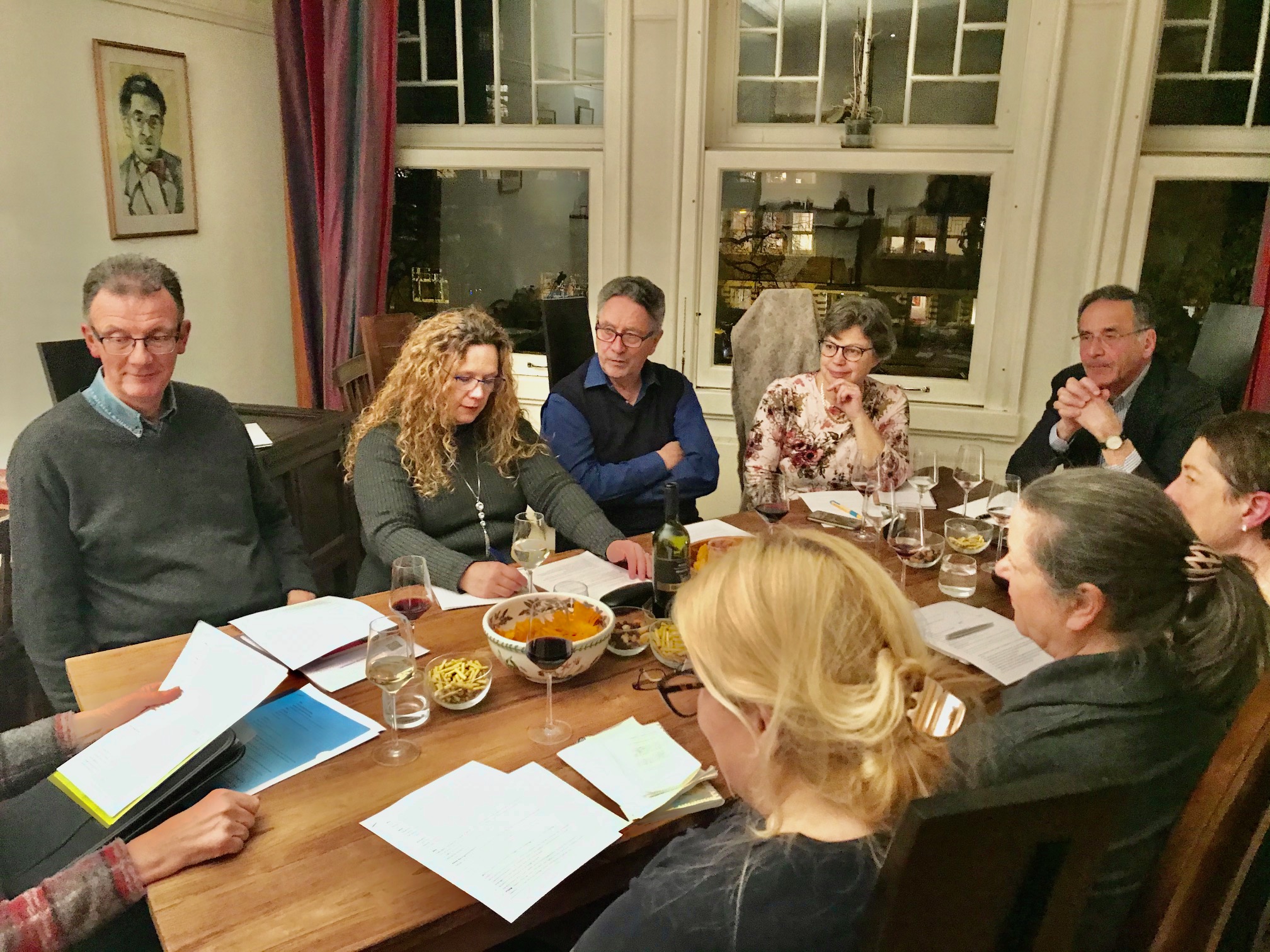 (Photo by John Hynd)
(Photo by John Hynd)
Nine of us gathered at John Alexander’s delightful Art Deco home in Amsterdam to discuss two barely comprehensible texts provided by Alison Gibbs and to learn from her extensive experience as an editor and translator.
While we munched on the nibbles and savoured the wines, Alison enthusiastically described her own types of work and clients, dispensed useful pieces of advice and outlined common pitfalls. One of her key suggestions (originally contributed by a wary/weary handyman) was to ‘know when to stop’. Other warnings included to avoid wasting time on grammatical blunders encountered during one’s everyday life: “There are more productive ways of channelling my nit-pickery than correcting greengrocers’ apostrophes.”
A dizzying array of practical and professional tips followed, including on how to assess jobs, clarify clients’ expectations, charge for one’s time, review editorial changes, use online tools and resources, and check for common errors.
While still attempting to digest this rich diet of advice, we gingerly bit into the two texts – and quickly stubbed our teeth. It was generally agreed that the almost impenetrable one about the Azores was worth steering clear of, while the taxation one was to be attempted only by the most intrepid souls (or those with serious insomnia). Alison’s own versions, however, read like an English-language dream – attesting to her dedication, finely-honed detective skills and feminine intuition.
We ended the evening much the wiser, not to mention a little the merrier. Hic!
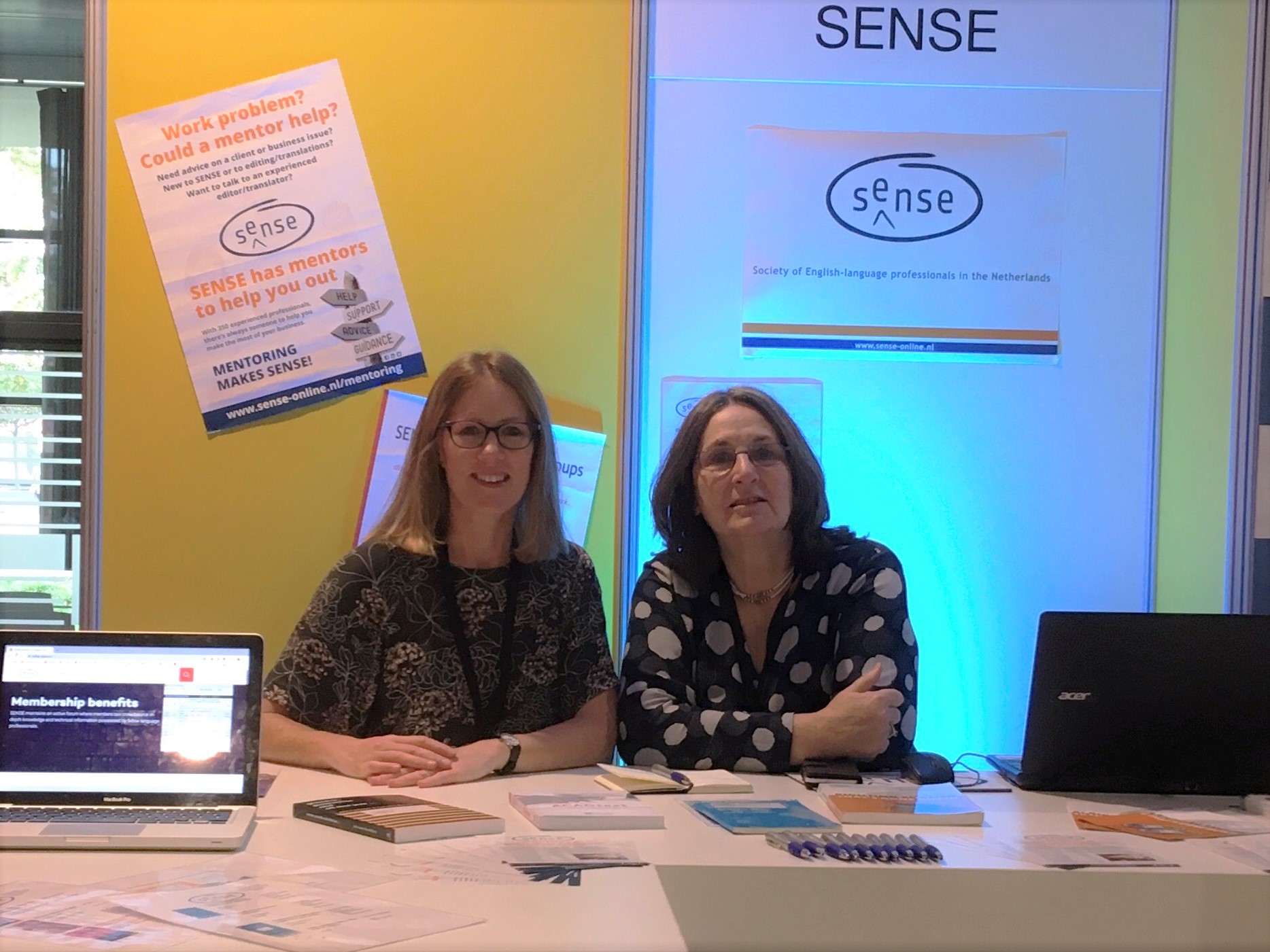
(Sally Hill and Daphne Visser-Lees at DRONGO language festival 2019)
Earlier this year, SENSE decided to book a stand at DRONGO language festival with the twin aims of raising our profile in the wider language community and potentially gaining some new members from the university and allied language communities.
For those of you unfamiliar with the DRONGO language festival, it started out in 2012 as a small afternoon event organized by De Taalstudio and held at Amsterdam Central Library. Since then, it has grown into a two-day event: as well as the exhibition itself, there is a two-day programme of language-related talks and interactive events. This year, DRONGO was held at the Elinor Ostromgebouw at Radboud University in Nijmegen. Our fellow exhibitors included publishers, academic institutions, the Royal Library of the Netherlands, the National Platform for Languages, the Ministry of Education, Culture and Science, developers of interactive educational equipment, the EU and representatives of many language communities, including Esperanto!
From about 08:00, students and teachers started walking past the stands on their way to class, and a number of them showed interest in what SENSE had to offer. Not long afterwards, fellow Friday exhibitor Sally Hill arrived bearing coffee and good cheer. Things really started to liven up from about 10:00; in fact, the SENSE stand had almost continuous footfall for the rest of the day.
We had a great diversity of visitors, but there was particular interest from some course co-ordinators from Radboud itself, from Utrecht University and from ITV: all were looking for English teachers and some for internships for their students. Emma Hartkamp from the European Commission stand came over to talk to us about the problems of recruiting freelance translators for the EU in the Netherlands.
As a number of our members are published authors, we had decided to take some examples of their books along, as well as SENSE publicity materials. As ever, Righting English that’s Gone Dutch proved popular – Joy Burrough’s publisher, who was also at DRONGO, was offering it to SENSE members at an extra special price. Both Lee Ann Weeks and Mike Hannay dropped by and were very pleased to see we were advertising their wares! Unfortunately, it was far too noisy to show the compilation video of Ed Hull’s recent YouTube appearances.
Some of the students who visited the stand stayed to talk to us for quite some time. They were variously full of enthusiasm about the courses they were following, and down in the dumps about their own level of English. At one stage, we felt somewhat like a couple of agony aunts, but we plugged our student membership rate and our mentoring programme, and emphasized the breadth of English-language knowledge available amongst SENSE members!
Mike Gould and Claire Koers, who manned the stand on Saturday, had a much quieter day. However, this did give Mike the opportunity to brush up his knowledge of the Berber language, while Claire attended a crash course in Frisian! During a tour of the stands, Claire also came across Olaf & Giraf, the leading characters in a series of books and other learning materials designed to introduce English to Dutch primary school children in a fun way. Sarah Thompson, the creator of this innovative concept, often goes into schools with her Dutch partner and reads her stories to the children. The main text is in Dutch, but English words or short sentences appear throughout the story, followed by a short explanation of their meanings in Dutch. This is also an ideal tool for parents raising their children in both English and Dutch.
From a personal point of view, my first visit to DRONGO was an extremely enjoyable one. It has that conference feeling in that we were most definitely among kindred spirits. It also threw up one or two unexpected incidents: I happened to mention my continuing difficulty with the correct use of the definite article to a passing Dutch teacher and was given an impromptu and extremely illuminating 15-minute lecture on the subject! It is still early days to say if DRONGO will have proved to be a good vehicle for recruiting new SENSE members, but I am sure we have managed to raise SENSE’s profile a number of language and university communities.
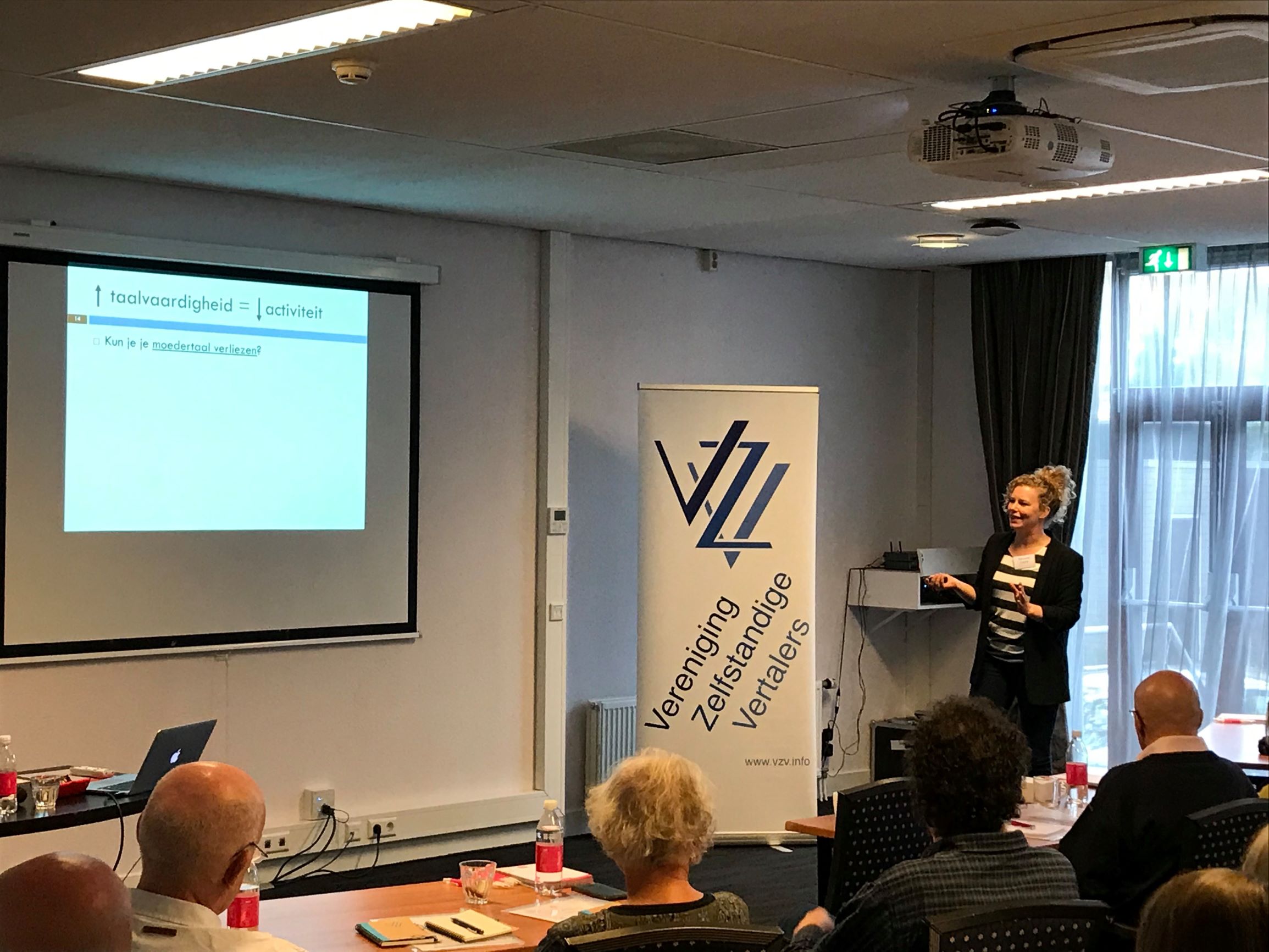
(Photo by Karin Krikkink)
This year’s theme of the symposium organised by the VZV (Vereniging Zelfstandige Vertalers) was: Mother tongue: a work in progress. The fact that this title did not end with a question mark already anticipated the final conclusion of the afternoon: Yes, it is a work in progress! You have to keep working on it, using it, immersing yourself in it, to make sure that you can continue to deliver quality translations. But back to the programme. We had an interesting start with Hanneke Loerts, lecturer at the Department of Minorities & Multilingualism at the Rijksuniversiteit Groningen, who talked about how our brain learns, processes and loses language. She took us along on the journey of how we learn language, from baby to young child to adult, showing how we grow and solidify connections between the neurons to learn and remember words. It was fun to see what happens in the brain with people who speak multiple languages: the brain has to work a lot harder to identify words in other languages than the one you learned as a child, and you can see that on the scans. The conclusion of research carried out is also that people who keep their brain active keep it healthier for longer. That is good news for multilinguals like us, but also for people who continue to learn and work with their brain in other areas, such as making Bob Ross paintings!
From the brain we moved on to the actual translation product on paper, and how language and our language skills have changed with time. Should we be worried about this development? And what can we do to safeguard the quality of translations in the future? Fedde van Santen, lecturer at ITV Hogeschool, talked about his mission to find the ultimate method to ensure that his students master their languages at the highest level of competence. After all, he argues, to be able to produce texts at a level that people with low literacy skills can read (B1), you really need to master a language at C2 level: the legibility of a text does not lie in short words, but in a logical construction of that text. And that is one of the major problems that Van Santen sees in the work of his students these days. One of the causes, according to him is that they hardly read anymore (well, they read, but mostly short texts on devices, not novels on paper), and as a result, they find it harder to make translations that flow, that have a logical structure, that use the right register, etc.
The panel discussion, also including Tia Nutters, language coordinator at the Rijksuniversiteit Groningen Language Centre, and Tony Parr, co-founder of Teamwork and well-known among seasoned language professionals, focused on these issues and also on the question posed at the start: how can we ensure we keep our mother tongue at a high level? And what actually is our mother tongue? We had a lively discussion, with native speakers of various languages confirming that to keep up with developments in your mother tongue, just translating and reading is not enough: you have to actually speak the language on a daily basis and immerse yourself in the culture, to make sure you don’t end up using the version of the language that was prevalent when you left the country twenty or more years ago. Indeed: a work in progress!
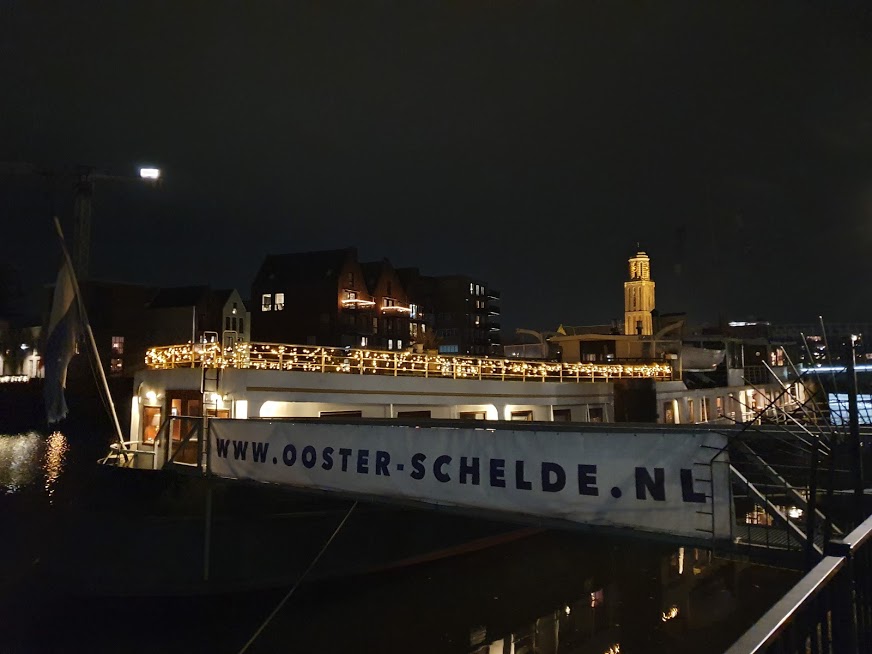
On Saturday 16 November, about 35 SENSE members and their partners gathered on board the historical Ooster-Schelde in Zwolle for good food, good fun and good conversation. Although the ship’s low ceiling proved somewhat challenging for anyone over 1.75m – yours truly and partner included – the location was very gezellig.
Dave Thomas welcomed us all and introduced the evening’s entertainment: acoustic duo The Tickets treated us to a range of ‘classics from the golden age of pop.’ While it proved difficult to hold a conversation without repeating yourself, the music definitely added to the hearty atmosphere.
Daphne Visser-Lees had come up with some excellent icebreakers to get us all off to a good start. We kicked off with ‘pin the apostrophe on the word’: after being blindfolded, Ellen Singer, Curtis Barrett and Daphne herself valiantly tried to provide increasingly complicated words with the correct punctuation. Naturally, those in the audience did their best to confuse them. Qu’est-ce que c’est?
The informal arrangement of chairs and tables were ideal for mingling, and the starters (warm beetroot and goat cheese salad, followed by a tumbler of pumpkin and tomato soup) were plated in such a way they could be enjoyed while standing. A very good start!
The main course consisted of a buffet and offered a variety of dishes. On a personal note, I was somewhat disappointed that two out of the three previously advertised vegetarian options were, in fact, not on the menu after all, but the remaining option and side dishes proved very tasty.
Once dinner was cleared away, it was time for another classic party game: pass the parcel! And what a sight it was: thirty-odd adults trying to gauge what was in each gift before reluctantly passing it on to the next person. Sadly, I didn’t go home with the coveted set of full-sized Toblerone bars... Enid Tomkinson regaled us with two poems recited by heart, and then it was back over to The Tickets for another set.
Any lingering doubts about the food were swiftly diminished once dessert was served. Apple pie and tropical hangop and chocolate mousse, oh my! After that, some more mingling and informal conversation over drinks. All in all, a highly enjoyable evening: definitely ‘voor herhaling vatbaar!’

At the invitation of PZO, I attended their recent event for freelancers at the Miele Experience Centre in Vianen on 10 October. The event was kicked off by two trendwatchers known as the Fountainheads. This dynamic duo took us on a journey through the latest technological developments and social trends; their high-speed delivery tested the limits of my Dutch, but the main message was that new learning methods, knowledge-sharing and a considerable adaptive capacity are essential tools in our fast-changing world. At the end, they implored us not to waste any valuable time, because every minute counts. In other words, if you snooze, you lose!
Cybercrime
We were then treated to a presentation by cyber-crime expert Rickey Gevers. Rickey once served an 18-day prison sentence for hacking the University of Michigan’s server. Nowadays, he puts his expertise to good use as Chief Intelligence Officer at the cyber-security company RedSocks and as an ‘ethical hacker’ at the Hacker Company.
He started off by telling us that awareness is key. In spite of all the publicity surrounding suspicious emails, people are still clicking links, opening PDFs, using unknown USB sticks, connecting to public Wi-Fi networks and using the same password for their business accounts (email/VPN) and their LinkedIn accounts.
His advice on passwords:
• Use symbols
• Use numbers
• Use both upper-case and lower-case letters
• Use a different password for each website
• Don’t write down your passwords
• Don’t store your password in your email account
• Change your password every month
• Make your password as long as possible
Apparently, President Obama was notoriously difficult about his passwords. He insisted on using 123456. However, when his security advisers finally persuaded him to change his password, what did he do? You’ve guessed it – 654321! You can check the password of your own email account on Rickey’s website. Just fill in your email address and see if he has good or bad news for you! He wrapped up by stressing the importance of backing up your work and updating your system. Do those updates straightaway!
Breakout sessions
After a delicious ‘walking dinner’ – what else would you expect at the Miele Experience Centre, well-known for its cookery workshops? – I attended two breakout sessions. The first one involved the ins and outs of working in the cloud or, to be precise, with Microsoft Office 365. We learned that this software allows you to be productive anywhere, to work better together and to protect what matters. You can use it on all your devices. As I work with Microsoft Office 365, I was particularly pleased to learn about some of the functionalities I had not yet discovered. It was also reassuring to learn that protection against spam, malware and viruses is continually updated.
The second breakout session was presented by the AON insurance company and Freelance.nl. Armed with an iPad, we all took part in a pub quiz and answered questions relating to our digital security. This was fun and informative. The session was rounded off by a tip from AON about the importance of cyber-insurance. Not many people know that ‘cyber risks’ are not covered by the insurance policies we normally hold.
Following the breakout sessions, which also covered topics such as working with social media, the secrets of good communication and the latest developments in digital payment methods, there were opportunities for networking, accompanied by the inevitable hapjes en drankjes! During this networking session, I had an interesting conversation with a member of Bites & Business – a nationwide network for women in business. This organization arranges monthly networking evenings (including dinner) in more than 25 locations around the country. During these evenings, women have the opportunity to exchange knowledge, ideas and experiences with each other. They also organize workshops, training courses and weekends away here in the Netherlands or abroad.
It was obvious that PZO had put a great deal of effort into organising this event. The keynote speakers and the breakout sessions covered a wide range of topics that are of particular interest to freelancers and there was plenty of opportunity to network with the presenters and other attendees. Well done, PZO!
(Photo courtesy of Robert Zwart for PZO, 2019)
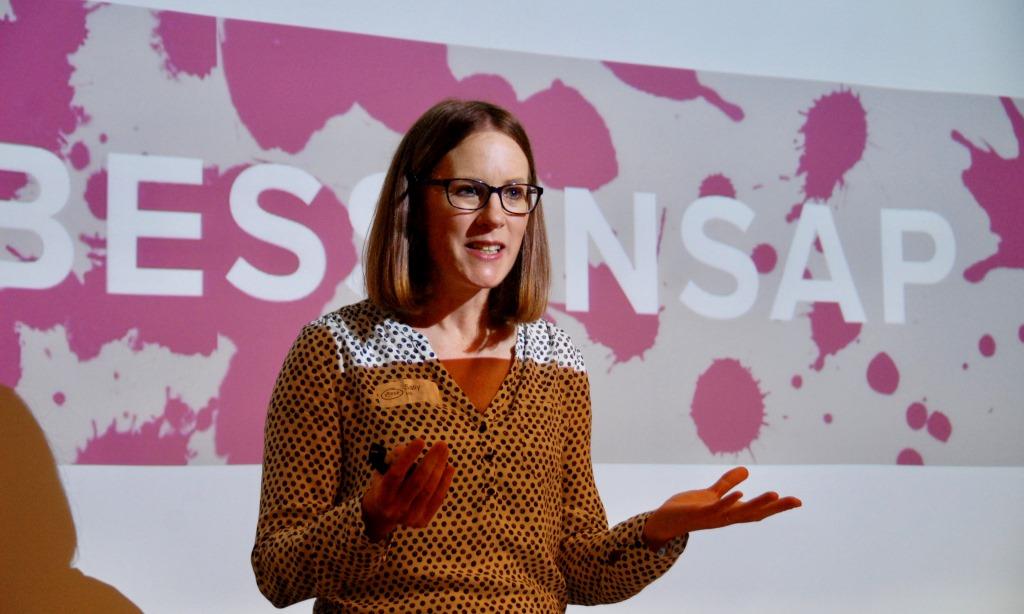
© Image by photographer Vanessa Goad of SENSE’ 2017 PDD, held at the Eenhoorn Meeting Center Amersfoort on 23 September 2017. All rights reserved.
Remember to send in your proposals for the SENSE Conference! We invite proposals that relate to the theme of the conference: 20/20 (Re)Vision: Honing our skills to meet market challenges.
Whether you work in editing, translation, interpreting, copywriting, teaching or any other relevant field, don’t miss this opportunity to share your expertise with fellow professionals!
Priority will be given to presentations, panel discussions and TED-style talks that express a clear take-home message and explain its relevance to a broad range of professionals in our field. Presentations could describe promising practices, report research findings, demonstrate techniques, share experience with new technologies or provide knowledge updates. As a knowledge-sharing and peer-training network of professionals, SENSE encourages submissions from both seasoned and novice presenters with expertise to share.
To submit a proposal, please complete the online form where you can enter an abstract of 200 to 300 words and a short biography (150 words maximum) by Friday 1 November 2019. Contributers to the 2020 conference will be granted a discount on the conference fee. SENSE is unable to reimburse travel or accommodation expenses.
Your abstract should briefly describe the what, how, and why of your presentation and it should have an informative title. If you would like to discuss the suitability of your proposal before sending in your abstract, please feel free to
Presentations will take one of three forms:
- TED-style talk: 15-20 minutes (including questions)
- Short presentation: 30 minutes (including questions)
- Long presentation or panel discussion: 60 minutes (including questions)
Please indicate the proposed length of your presentation.
We are also inviting proposals for workshops, to be held the day before the conference – Friday 5 June. The duration of the workshops will be 3 hours 15 minutes (including a short break).
The deadline for submitting your proposal and biography is Friday 1 November 2019. You will be informed by mid-December 2019 whether your talk or workshop proposal has been accepted.
Complete the presentation submission form here.
Complete the workshop proposal form here.
Whether or not you are considering giving a talk at SENSE 2020, we think you'll find invaluable tips for talks and presentations in this book ‘TED Talks: The Official TED Guide to Public Speaking’ by Chris Anderson, Head of TED. Our conference team will also be using the ‘On Stage’ section of the book to help give our speakers the best possible experience.
We look forward to receiving your proposals!
The 2020 Conference team
Lloyd Bingham, Ashley Cowles, John Linnegar, Ken McGillivray, Nigel Saych, Theresa Truax-Gischler, Jenny Zonneveld
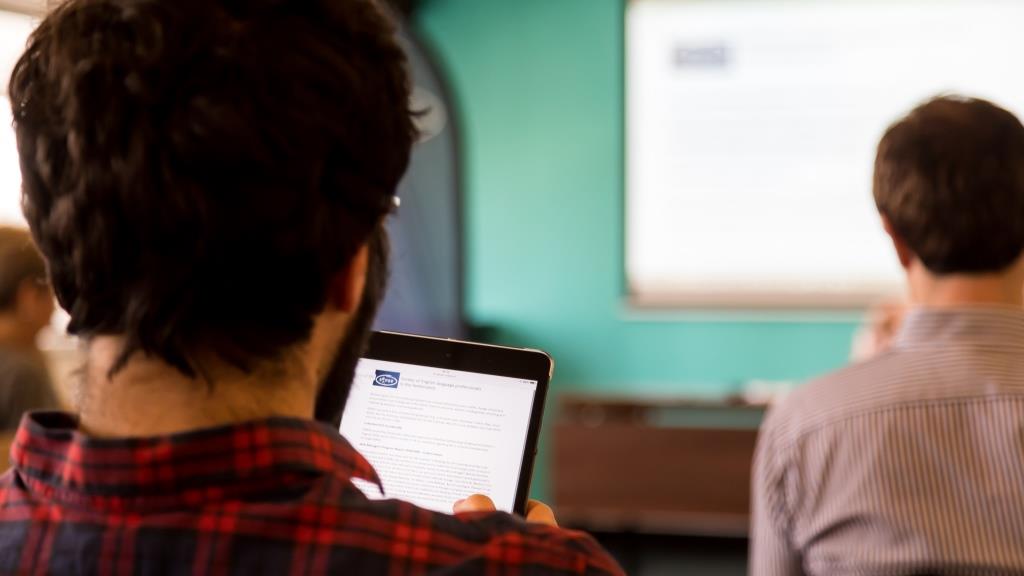
Photo by Michael Hartwigsen for SENSE, all rights reserved.
We have some very interesting and useful opportunities for continuing professional development planned, so be sure to save the dates! For more information and event registration, check out the SENSE Events page. Both events are open to non-members, so if you've been meaning to check out a SENSE event, now is your chance!
TAX SEMINAR
Delft, 10 December 2019, 14:30-17:00
Presenters: Tax Consultants at AAME
Hosted by AAme Tax Consultants at their offices in Delft, this seminar will shine the spotlight on issues surrounding the submission of tax returns at the end of the current tax year. The seminar will focus on changes in the Dutch tax system since 2017 and the Dutch government’s planned new proposals; some end-of-year tips and tricks to make you more tax efficient; and prospects for 2020. Issues relating to VAT, practitioners' administrative obligations and, last but not least, tax-related tips and tricks (including some on retirement funding) will also feature. There will be time for Q&A where participants will be able to have their particular tax-related questions answered.
An added bonus: members are welcome to send their questions to the Professional Development Coordinator by 8 November at the latest. As an add-on to this workshop, SENSE will be suggesting a selection of Delft’s many eateries at which you will have the opportunity to meet and network over a post-session meal, if you wish.
About AAme Tax Consultants
Based in Delft, AAme Tax Consultants provides tailored services for companies and individuals within the labour recruitment and secondment industry in the Netherlands. Their mission is to simplify the complex Dutch tax, civil and accountancy laws and regulations and make them more accessible. They advise on various aspects of the Dutch Tax and Employment Law, offer assistance in setting up their clients' payroll and offer various solutions for working contractors, freelancers and employees.
WRITING WORKSHOP: THE WRITE STUFF
Utrecht, 11 January 2020, 09:30-17:00
Facilitator: Ros Schwartz, FITI
Good prose stems from having confidence in one’s writing skills. Translators often see themselves as 'humble servants' of the original source text rather than as confident, proactive and competent writers. This workshop aims to change that mindset and empower translators to use all the resources of the English language to develop their target-language writing skills. It’s designed for translators into English working in different fields, who, Ros says, will 'gain confidence in their writing skills, deliver higher-quality translations and, ultimately, feel able to break into premium markets as outcomes of the workshop.'
About the presenter
Ros started out as a literary translator, but soon became aware that her writing skills would serve her well in other fields of translation where good writing mattered. For the past two decades, she has been energetically involved in translator training, having dedicated herself to nurturing translators and guiding them to becoming better writers. She gives masterclasses worldwide, always with the emphasis on developing attendees’ writing confidence. Ros contributed a chapter to the 2007 academic publication The Translator as Writer (Continuum, 2007). Co-founder of a literary translation summer school at Birkbeck in 2011 (now at Warwick, UK), she joined forces with Chris Durban to create 'Style Matters', a writing development module much in demand internationally.
Speaking of professional development, remember that the deadline to submit proposals for the SENSE 2020 Conference is Friday 1 November! Priority will be given to presentations, panel discussions and TED-style talks that express a clear take-home message and explain its relevance to a broad range of professionals in our field. Presentations could describe promising practices, report research findings, demonstrate techniques, share experience with new technologies or provide knowledge updates. As a knowledge-sharing and peer-training network of professionals, SENSE encourages submissions from both seasoned and novice presenters with experiences and expertise to share.
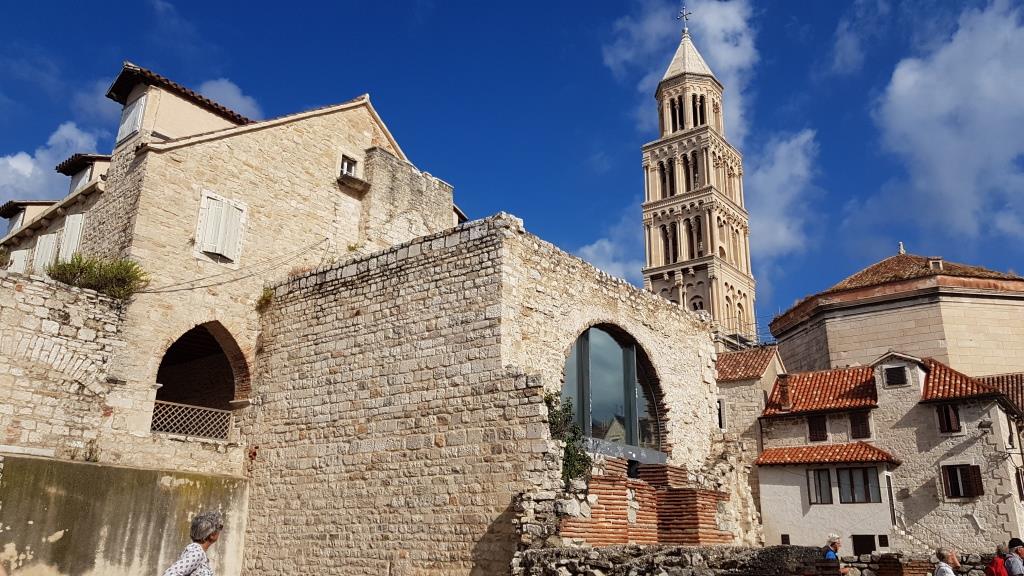
The MET Conferences have become a recurring autumn event in my calendar. A few years ago, when I was part of the organizing team for the first SENSE conference, held in 2015, fellow SENSE, MET and ITI member Joy Burrough-Boenisch suggested I might like to attend a MET conference. ‘It would be a fun experience’, she said, adding that I could find out first-hand what makes a good conference! So, in October 2016 I set off to Tarragona, south of Barcelona in Spain for my first METM. It was my first business trip abroad since becoming a freelance language professional. I’ve not missed a MET conference since.
As delegates must travel from far and wide to attend, MET does its utmost to keep costs down and ensure that their conference is affordable for all. The edition in Split, Croatia was no exception and this year even the workshops were not included in the conference price so delegates could really pick and choose. Needless to say, many of the pre-conference workshops were sold out within a few days, even the one I was giving on Word skills for translators and editors.
There is always something for everyone at a MET conference: workshops, plenary speakers, panel discussions and ‘regular’ presentations in two or three tracks. I like the pick-and-mix of a varied programme; within the comfort of the conference there are sessions to take you way outside your comfort zone. And it’s at these sessions I’m always pleasantly surprised by the gems of wisdom and tips that are there for me to grasp.
A METM would not be complete without the off-conference activities. There’s always drinks for early arrivals on the Wednesday evening and a social activity on Thursday morning before the workshops start. This year it was a guided tour of the splendid old town of Split comprising of the 4th Century Diocletian's Palace and historical centre, all of which is an amazing UNESCO world heritage site. And I should not forget to mention the off-MET meal groups, which are an excellent opportunity to get to know your fellow conference delegates. Because these are so popular, and the MET organizers only allow you to sign up for either Thursday evening or Friday lunch time, and I didn’t want to be without company for a meal, I volunteered to host a lunch – our topic for discussion was ‘Feedback is a two-way street’. The time passed by quickly and before we had exhausted the topic it was time to return to the conference venue.
MET conferences are an excellent opportunity for networking and while in Split I spent time with some of my SENSE colleagues who I hardly see in the Netherlands. It’s also a great time for meeting colleagues and making new friends from other countries and organizations. During the Saturday buffet lunch we had arranged to meet up with our sister-society committee colleagues from ITI, NEaT and of course MET. We had a productive ‘huddle’ and agreed to collaborate more closely, particularly to share our efforts and to establish a WhatsApp group to encourage sisterly communication!
There were three sessions at METM19 that I found particularly interesting. First, the workshop memoQ: the secrets of a flexible CAT tool revealed given by Juliet Macan. She set out to show us a path through the jungle of tools available to the translator and the myriad of features and settings in memoQ in particular. The combination of theory and practical exercises gave me the extra boost I needed to be confident about using memoQ more frequently.
Second, the session given by Maeva Cifuentes entitled Content marketing 101 for translators. Maeva has spoken on marketing at several conferences I’ve been to and because I have more work than I can cope with already, I’m not intending to start a blog to promote my own business, but I did want to hear what she had to say and now I have a little more understanding of what some of my clients want to achieve with their articles and blogs.
Besides the two keynote speakers, who this year were excellent, the third memorable session for me was that given almost at the end of the conference by SENSE and ITI colleague Lloyd Bingham on Translating pseudo-English. Now, this is something I come across every day in my Dutch texts and everywhere around me in the Netherlands. Thanks to Lloyd’s entertaining talk, I’m now more aware of pseudo-English and how to deal with it.
I came away from METM19 in Split with a post-conference buzz, with a high level of adrenaline generated by a few days of intensive networking and CPD absorption, and of course the wonderful weather and magnificent location. It’s an addictive feeling, partly fuelled by my desire to give something back to the professional organizations that have helped me develop as a freelance language professional – so it’s quite likely I’ll be attending, presenting and helping at future conferences, whichever society is the host.
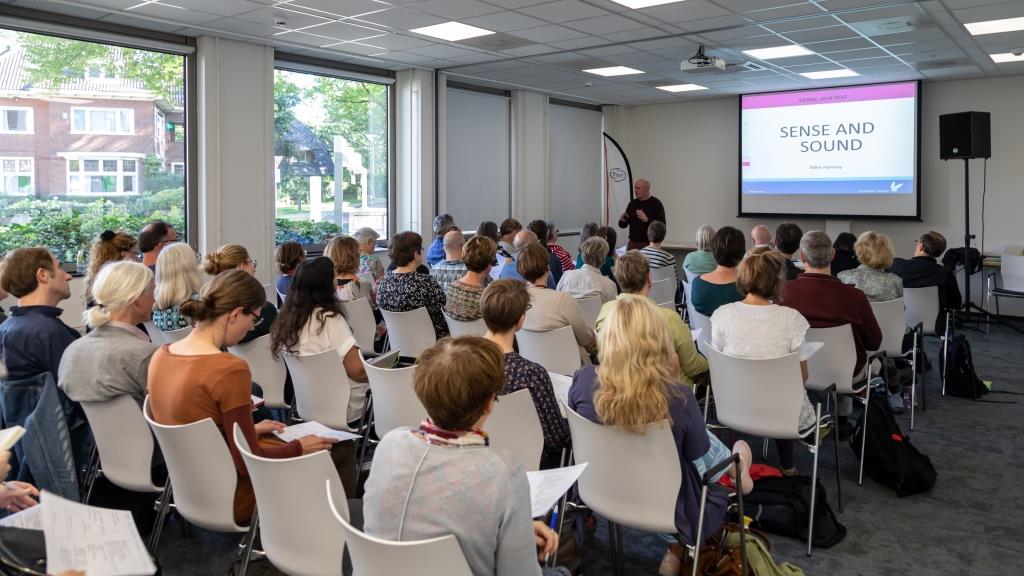
On 21 September, SENSE held its biennial Professional Development Day (PDD) for editors and translators. I was excited to be attending my first SENSE PDD! The two plenaries and four parallel sessions ensured there was something for everyone – editors, translators and copywriters alike.
After some coffee and networking, the day started with a plenary lecture by Jenny Zonneveld, who gave us a number of valuable tips on how to gain repeat clients: be an expert in your field, network, attend events, and build sound relationships. She warned us that this will require leaving our comfort zone, though!
Next, I attended a fascinating presentation by Dianna Beaufort on writing and translating in architecture and urban planning. Dianna guided us through some problems caused by ‘architecture and urban development speak’ or false friends. Translating een karakteristieke oppervlakte into ‘a characteristic surface’, for example, does not work!
Peter Smethurst presented the next talk I attended, titled ‘Translating for fun and profit’. He made us privy to his workflow and provided us with a number of useful tips: do not fill in more than 90% of your time, have the computer read the text to you when you are done (to check for errors), and prove to the client that you add value by pointing out mistakes and querying anything that is unclear.
After a traditional Dutch lunch that included kroketten and milk, it was back to business with a presentation on estimates: Jenny Zonneveld and John Linnegar urged us to take our entire workflow into account when preparing our quotes. We discussed the different ways in which we charge for time spent on admin and communication. John mentioned a handy word-count tool called PractiCount which helps editors and translators estimate how long their job will take.
Next up were Jackie Senior and Dr. Kate McIntyre, with a fascinating and hopeful presentation on the role of language professionals in academia. Higher education in the Netherlands is increasingly English-speaking, which creates many language needs. Language professionals in academic settings are not only providing editing services for grant proposals, journal articles, and dissertations, but also helping draft universities’ internal communications in English and teaching writing courses.
The final lecture was by Dr. Mike Hannay on flow, rhythm and balance in writing. He told us the key to writing that flows is variation. Good writing is attractive, clear and coherent, genre-faithful and accurate. He also discussed prosody and the study of rhythm, meter and intonation in poetry. Mike’s handout provided many examples of problematic copy, and it was great fun working through them with other language professionals.
The day ended with the announcement of the location of next year’s conference (which was delivered through a game of Hangman) and a lovely borrel (of course accompanied by bitterballen). This gave me the chance to finally meet some people I had interacted with only virtually, and to make some new friends. I am definitely looking forward to attending next year’s conference in Maastricht!
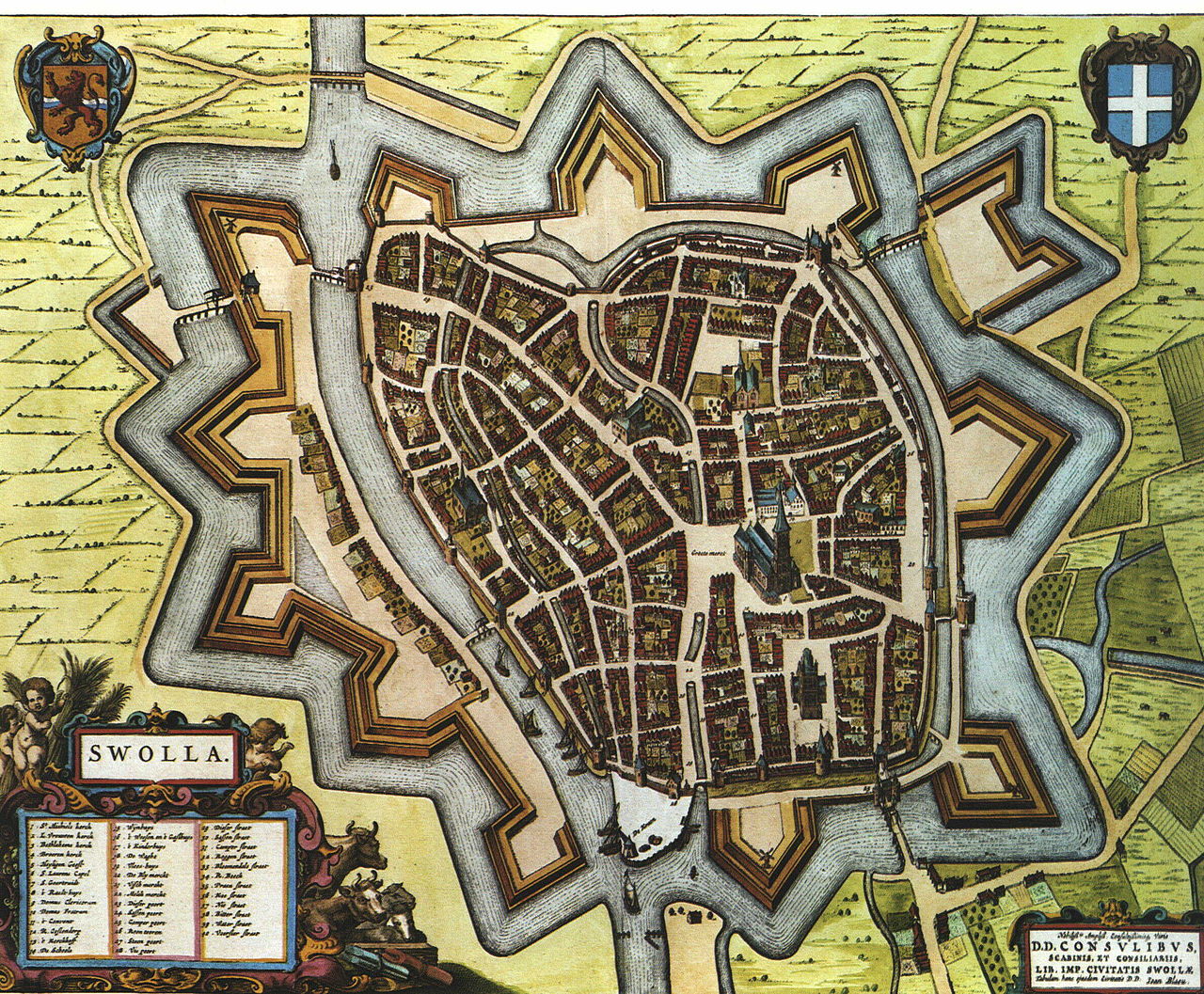
Historical map of Zwolle (from Wikipedia)
One drizzly afternoon in downtown Zwolle, Eastern SIG’s autumn borrel took place in the cosy confines of Winebar OAK. Billed as an informal ‘catch-up’, it wasn’t all-play-and-no-work that made this meeting such fun. We talked shop, of course, whilst tucking into plates of delicious snacks and knocking back (but not over) a glass or two of a somewhat tart yet surprisingly good Spanish red, ordered no doubt to train our palates for METM20 next year.
Among the tabled topics were ‘winding down working hours once you’ve hit retirement age’, and a perennial problem for zzp-ers: ‘chasing defaulters’. This reminded a superb storyteller of when she was a novice translator/feisty detective and tracked down the real home address of a con-man/client, whose letterhead stated ‘with offices in London, Paris and Emmeloord’ (she should have been warned) and, assisted by the Fraud Squad, managed to get paid. In full.
Talk of payments turned to the price of things in general, like the cost of booking a venue for a network of medical and science writers. Amsterdam Public Library, it seems, is conveniently close to Central Station and quite an affordable établissement when ten or so people turn up. Somewhere for SENSE to think about? This suggestion inspired a spate of word-perfect Français on the juste rewards of living and working in France (I think).
Dwelling on the good things in life brought us to the SENSE dinner, being held this year on the good ship Ooster-Schelde. Built in 1933 and originally a ferry for the Provincial Steamboat Services in Zeeland, the ship is moored in Zwolle, an understandably glad fact for local members who seem keen to welcome this SENSE event to their town. Despite its dozy reputation, Zwolle is anything but dull, not even in damp October, judging by my walk along the picaresque vesting and winding lanes to the venue. This peppy town has a long and glorious history, indeed a history so long its Golden Age (oops) predates the rest of the NL’s by a century at least. Take that, Hollanders!
But I digress. It seems that most of the eight or nine members present are coming to the dinner, most with partners in tow, and we’re eagerly looking forward to the chance to mingle with colleagues, talk shop and simply have fun chattering in English, just as we did at this social.
